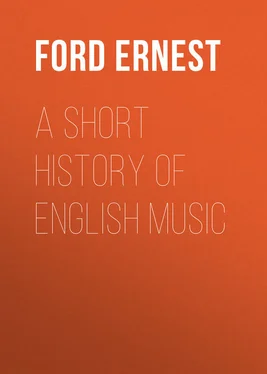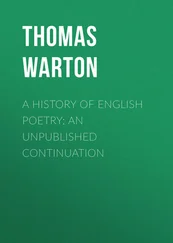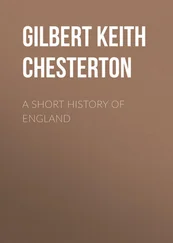Ernest Ford - A Short History of English Music
Здесь есть возможность читать онлайн «Ernest Ford - A Short History of English Music» — ознакомительный отрывок электронной книги совершенно бесплатно, а после прочтения отрывка купить полную версию. В некоторых случаях можно слушать аудио, скачать через торрент в формате fb2 и присутствует краткое содержание. Жанр: music_dancing, foreign_antique, foreign_prose, на английском языке. Описание произведения, (предисловие) а так же отзывы посетителей доступны на портале библиотеки ЛибКат.
- Название:A Short History of English Music
- Автор:
- Жанр:
- Год:неизвестен
- ISBN:нет данных
- Рейтинг книги:3 / 5. Голосов: 1
-
Избранное:Добавить в избранное
- Отзывы:
-
Ваша оценка:
- 60
- 1
- 2
- 3
- 4
- 5
A Short History of English Music: краткое содержание, описание и аннотация
Предлагаем к чтению аннотацию, описание, краткое содержание или предисловие (зависит от того, что написал сам автор книги «A Short History of English Music»). Если вы не нашли необходимую информацию о книге — напишите в комментариях, мы постараемся отыскать её.
A Short History of English Music — читать онлайн ознакомительный отрывок
Ниже представлен текст книги, разбитый по страницам. Система сохранения места последней прочитанной страницы, позволяет с удобством читать онлайн бесплатно книгу «A Short History of English Music», без необходимости каждый раз заново искать на чём Вы остановились. Поставьте закладку, и сможете в любой момент перейти на страницу, на которой закончили чтение.
Интервал:
Закладка:
Ernest Ford
A Short History of English Music
This book is not, in any sense, technical.
It is an attempt to give a simple and rational, though in a volume of this size, necessarily incomplete, account of events that have led to the complex state of music existing in England at the present time.
Should it offer nothing to the musician or historian, I hope it will be found of interest to the general reader.
The desire to make each chapter as complete, on the subject with which it deals, as space would permit, has necessitated a certain amount of repetition, but I trust that the object will condone the fault.
THE AUTHOR.
CHAPTER I
MUSIC BEFORE AND DURING THE REFORMATION
England at one time musical and "merrie" – England before the Reformation – Out-door life – Natural dramatic instincts – Isolation of country districts in early days – Performances of itinerant minstrels – Ban of the Church – Gradual improvement – Effect of the wars of the Roses – Early perfection of sacred music – Difficult times after repudiation of Rome by Henry VIII. – His policy and that of Queen Elizabeth – Edward VI. and his sisters – Popular anger against the monks – Dissolution of monasteries natural result amongst uneducated people – Tallis entrusted to write music for reformed services – Orlando Gibbons and Henry Purcell – Early secular music – Old-time music occasionally traceable now in country districts – Ancient instruments – Effect on English music by those returning from the Crusades – Effect on criminal population – The status of the musical composer compared with that of the "musician" – Conclusion.
England was musical – once upon a time. 1 1 A country that has taken its music at the hands of the foreigner for three centuries can scarcely be called musical.
At least, if it be not too great a strain on our credulity, we must believe so.
England was "merrie" 2 2 In its original meaning, the term implied a cheerful and righteously joyful sense of living. Its popular significance after three centuries of Puritanism, rather inclines to alcoholic elation.
– once upon a time. At least, we read so.
It must have been long ago, and the art long lost.
And yet there was, undoubtedly, a time when England was both musical and "merrie." Yes. When music and "dauncing" were as essential to the life of the people as ranting and canting apparently became in those dismal days after the Reformation, when the spirit of Calvinism stalked abroad, strangling all the rational joys of life. Yes. Those were, indeed, the merrie days of England.
The pageants and plays, which arrived at such a pitch of splendour and magnificence in the reign of Queen Elizabeth, were but the successors of more primitive ones whose history is lost in the long and silent past.
It is, however, quite clear that, like nearly everything else of healthy vitality, we must look to the Church, if not for their origin, at least for the shape and form they came to assume during the Christian era.
Throughout human history there have ever been men gifted with a dramatic temperament who, through sheer natural instinct, not only dramatise their own experiences when they would relate them, but dramatise with equal avidity, any material which may come to their hands for the entertainment of others and the relief of their own exuberant vitality.
A combination of such gifted, congenial spirits would be, not so much probable as inevitable. Hence the bodies of strolling players, regarded by the guardians of the law, doubtless with much excuse, as rogues and vagabonds, who toured the country districts, and were to all appearance, in a state of constant conflict with the "Dogberrys" of the day.
It is difficult, if not impossible, for us to realise the isolation of small communities in mediæval times, but it is not difficult to imagine the excitement that a visit from one of these troupes would arouse; not only on account of the amusement they would afford, but for the news they would bring of that outside world which was, probably, at once a source of curiosity and dread.
It must be recorded that the kind of entertainment given by these itinerant players, was frequently of such a nature as to give a shock to the simple countrymen it was designed to amuse.
Coming directly from the coarse amusements and excitements of London, that included about every possible species of vicious depravity, most of which cannot be written about, and the more innocent, including bear-baiting, drinking contests and cock-fighting, it is not to be wondered at that their displays caused something akin to amazement.
One result was inevitable.
The Church stepped in, banned the performances, and threatened to exclude all who were engaged in them from her sacraments.
However, with the wonderful intuition which seems so clearly to eliminate the purely human theory, she seized upon this elementary instinct to purify it and dedicate it to the highest ends. From that time through many ages the performances were given with the direct sanction of the Church, and were not infrequently utilised on festival occasions, in the precincts of her sacred buildings.
It must not be assumed, however, that in the early stages of the cleansing process any very high standard could be insisted upon. Such an attitude would have put the clergy out of touch with the primitive people, and wholly destroyed the possibility of effecting any lasting good.
Biblical subjects of a simple kind were chosen for portrayal, the story of Adam and Eve being a particularly popular one, and presented with a crude exactitude that would cause considerable astonishment to a modern spectator.
But gradually subjects of a more elevating character were introduced, and at last the most moving incidents in the life of Christ were represented. Thus it is obvious that the Church had no desire to stifle the dramatic instinct; she simply used her power and authority to direct it to a nobler plane of thought, and help it to become a source of healthy education, instead of a form of moral degradation. Indeed, the most sacred and inspiring service in her liturgy, the Mass, is a dramatisation of the fundamental truths of Christianity.
The Englishman of the Middle Ages was coarse in speech and manner, but he was eminently susceptible to the call of art in whatsoever guise it came, religious or secular.
The beauty of the cathedrals with their noble altars and gloriously coloured windows and, perhaps most of all, the call of the music which played so large a part in all the functions, would, at least, help to combat the gross spirit of the outer world, and tend to an amelioration of the prevailing tone of the age.
There had been, however, many companies of players who had defied the Church's ban, and continued their performances of unbridled licence, trusting to the general lawlessness of the times to evade the consequences; but with the passing of the Wars of the Roses and their attendant misery, bloodshed and abrogation of civil law, a period of brutality, rapine, and all the consequent horrors of a fratricidal conflict came to an end, and the power of the law, both ecclesiastic and civil, was once more able to actively assert itself. A reign of peace and the confirmed power of the Crown began to inspire a general sense of security. Such wealth as the country possessed, instead of being squandered on the machinery of war, could be spent to ensure the blessings of peace.
Education, even the most elementary, was a boon to a man who, beside the manual work necessary to enable him to feed himself, had hitherto learnt nothing but the use of the pike or some such weapon of warfare.
Читать дальшеИнтервал:
Закладка:
Похожие книги на «A Short History of English Music»
Представляем Вашему вниманию похожие книги на «A Short History of English Music» списком для выбора. Мы отобрали схожую по названию и смыслу литературу в надежде предоставить читателям больше вариантов отыскать новые, интересные, ещё непрочитанные произведения.
Обсуждение, отзывы о книге «A Short History of English Music» и просто собственные мнения читателей. Оставьте ваши комментарии, напишите, что Вы думаете о произведении, его смысле или главных героях. Укажите что конкретно понравилось, а что нет, и почему Вы так считаете.












